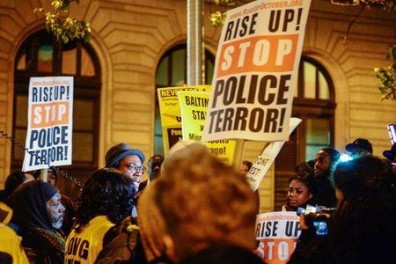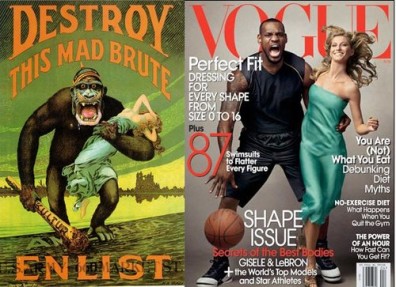As an African-American woman, who supports Black feminism, this topic is out of my usual comfort zone to talk about but it is an issue that needs to be brought to light. Black men and boys are now considered prey to our society, yet no one is doing anything about it. There has been no in depth research or analysis on WHY this is happening, and the only answer that is given in response to their deaths is racism. Well that answer does not suffice. If it is racism, then why are Black males the ones being victimized the most? And even if racism is the answer, there is nothing being done about it because America does not call it racism. America justifies these deaths by saying that Blacks deserve death for the danger they pose to society and the phobia that has been created in the white imagination.
Black males fill the bottom of every measure of the American population’s prosperity and health, and even though this is the case, because they are men, they are seen as having gender-based benefits. The fear of researchers and scholars in studying the misfortunes of Black males in society is rooted from the “danger” that it might reinforce gender based hierarchy and empowering men poses potential “dangers.” Let me translate this into simpler terms: White America will do anything to maintain its superiority over African Americans, and empowering Black men poses a threat to their domineering position. Because there is such a division between those who are considered to be “more oppressed” it prevents the ability to do a serious study of the relationship between the historical and political causes of the violence against Black males. Not addressing the deeper causes for the death of so many Black men means that we are also failing to address America’s seemingly endless killings of Black males. This is something that should not be able to be so easily concentrated to acts of racism.

While Black men and boys continue dying because of state and white vigilantes, scholars are “highly encouraged” to refrain from theoretically accounting for these deaths through any sort of philosophical study. Why might you ask? Well, allow me to assist you in your thoughts… There is mass resistance from our universities and our scholars to consider Black male vulnerability beyond feminism or other stereotypes that link Black males to being culturally unstable and inherently violent. Any study of Black male vulnerability is targeted as an act to erase Black female suffering. THAT IS NOT THE CASE! In studying Black male vulnerability, we are not erasing Black female suffering or anyone’s suffering. If anything, this movement to understand why Black males are being murdered would help strengthen the foundations of Black feminist organizations or movements like #BlackLivesMatter. Black males are disproportionately affected by violence, incarceration, poverty, unemployment, and suicide in America, yet we insist that the deaths of these Black men do not need to be accounted for. It is this silence that ultimately takes advantage of the deaths that cause Black men to be underrepresented in our society.
Is the “negrophobia” that pushed white America to support lynchings as a form of murder is the same fear and anxiety that allows the white public to endorse the murder of Black men and boys as “justifiable homicides”? Police officers justify the killings of Black males by claiming that they were in “fear of their lives.” America has created a system that justifies police violence, mass incarceration, and exclusion. The concepts about Black masculinity is used to justify the murder of Black males in society and complicate the full picture of Black male oppression in America. But where did this stigma or phobia come from and how did it obtain so much power? Well, often times, society imagine the Black boy, a child, to be physically threatening, and this idea is manifested through savagery inherent to Black stereotypes. Black males have also been associated with animals (monkeys and apes) which diminishes any form of sympathy that was left for their humanity. As a result of these characterizations, there is more acceptance of higher levels of violence directed towards them.
Ultimately, there is a clear connection between the deaths of Black males in society and the erasure of Black men from the realm of theory. The current theories in place that associate the death of Black males to the broad description of racism is a claim that in neither thoroughly research or analyzed. Because of this, there is an inability to depict the particular kind of oppression and violence that defines Black male existence. It is as if society classifies the deaths of Black males as being racist acts of violence and then finds ways to justify those acts and then move onto the next case. Michael Brown was a victim and example of the power a white life has over Black male existence and is a clear demonstration of the seemingly abundant power of white individuals’ ability to enforce the anti-Black agreement against these particular Black males. Black male death represents the fact that racism is the power whites have over the world which results in the insignificance of Black lives. Black men are thought to simulate white patriarchy which is something that is unattainable because of Black male disadvantage, but one that is affirmed through society’s certainty in the decision that his death is the only way to fix the dangers he poses to society. But these deaths honor the unfinished, perhaps unending, struggle to assert black humanity in a country built on its denial.
References
Butler, P. (2013). Black Male Exceptionalism: The Problems and Potential of Black Male Focused Interventions . Dubois Review.
Goff, P. (2008). Not Yet Human: implicit knowledge, Historical dehumanization, adn contemporary consequences. journal of personality and social psychology, 292-306.
Goff, P. (2014). The essence of innocence: consequences of dehumanizing black children. journal of personality and social psychology, 526-545, 540.
Hutchinson, D. (2010). Identity Crisis:Intersectionality, Multidimensionality, and the Development of an Adequate Theory of Subordination. Michigan Journal of Race and Law.
McDaniel, A. (2011). The Black Gender Gap in Educational Attainment: Historical Trends and Racial Comparisons. Demography.
Wynter, S. (2006). Interview in Proudflesh. Proudflesh: New Afrikan Journal of Culture, Politics & Consciousness.
